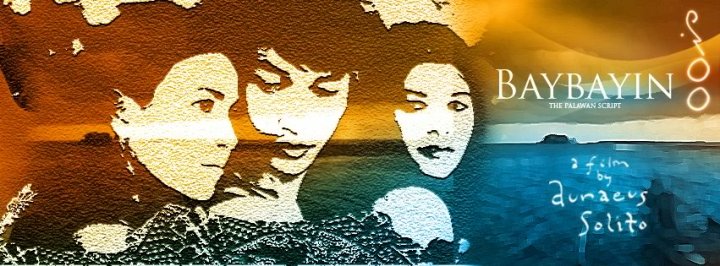
Baybayin: The Palawan Script
Written and directed by Aureaus Solito
Music and Sound by Diwa De Leon
Starring Alessandra and Assunta de Rossi, Adrian Sebastian and Sue Prado
Alba and Alban are half sisters who share the same name when written in “Baybayin” (which I’ve learned was incorrectly referred as “Alibata” but is known as the Tagalog/Filipino Script). Alba’s father is Canadian, while Alban’s father is a Palawan who died a few years back due to malaria. Their mother is a healer who at the beginning of the film cures a young boy named Bagtik from being sick and possessed. Upon being cured, Bagtik decides to never speak again and chooses to write in Baybayin as a means of communication for the rest of his life.
Alba and Alban form a friendship with Bagtik and they grow a fondness for him and his innocent ways. Their mother and their father notice this and had once talked about how their friendship might be like an old fable about two sisters falling in love with one man. A few months later, their mother dies from Malaria. As a tradition in the Palawan culture, when a family member dies the family left behind must leave their home and build a new one elsewhere, so that they can leave the past and move on. Alban being the oldest is left with her relatives, while Alba is taken by her Canadian father.
A few years later, Alban and Bagtik are now older, played by Assunta de Rossi and Adrian Sebastian. Their fondness has bloomed into love and so they decide to live with each other. Assunta picks the spot at her former childhood home, a lovely spot beside the shore and a shoreline that connects their home to the other island, which seemed to be traced by God Himself.
Alba is now played by Assunta’s real life sister, Alessandra de Rossi, who also played a part in Solito’s Busong. She is now clad in modern clothes and speaks Tagalog more fluently than Palawan. She makes a stop first by a relative’s birthday party wherein she meets a soldier who introduces himself to her. This man is played by Mon Confiado who reprises his role as, well, a promising villain. Alba ignores his attempts to woo her and he seems to be dissatisfied by this. On the evening of her stay, he attempts to rape her but she manages to fight back and run away into the forest. In the forest she is found by an old friend who takes her to her sister.
What I don’t like much about previous Filipino films is that when there is a necessary shot in the forest, especially at night, you will anticipate a fight with the darkness. You will be left clueless as to why there is a scene in the forest although there is nothing you could see. Independent and mainstream cinema has improved and we can now see into the dark spaces, unless it is a required technique that everything has to be dark and the acting is really blah.
Unless the projector used is really dull, I assure you that although some scenes were shot during dawn or at night, you can see that the acting (especially the locals) is really natural. I was worried at first that I might not see Alessandra properly making her way out of the forest, but I was not disappointed. The “innocent” love scenes between Alban and Bagtik are also impressive. Since it is told in the movie that Palawans do not kiss but rather they feel each other’s presence, and that is enough. It felt romantic and important, not cynically depressing.
The people’s love for tradition and their island is not always evident in all places. This pretty much describes our whole country in general. While others strive to protect our Indigenous people, others are blinded by what money, modernism and image can do. Aureaus succeeds in showing us the beauty of own country, our own traditions, our own language, and that love is innocent and kind, if that is what this movie attempts to show us about.
Mon Confiado’s character along with the American tourist and his stout, colonial-mentality infused wife help make the movie real, by trying to steal this Paradise from its caretakers. There is one scene in which Mon and his troop find their way into the elders’ ceremony and steal their gongs just because he heard that the gongs are expensive when sold and that the sound of these have irritated him for the past three years.
The de Rossi sisters are effective as Alba and Alban. I have never heard of them being in love with one man in real life but if they have been able to translate it to the film quite convincingly. They are both known to be loud and outspoken in real life but they have a way of being their exact opposites in the films they star in. Not that I am offended by them being chosen in this role. I was actually excited to see them act together again. They are effective as a team, along with Adrian Sebastian, because they understand each other. A normal person, let’s say that person has been brought up in values of this dog-eat-dog world, would not allow this situation to happen. But since Alba understands that Alban and Bagtik have been taught growing up that this kind of situation happens. That kind of innocence and naivety can exist. This kind of idea may sound threatening to most of us, but the three makes it seem harmless. That as long as love exists, in both sisters and their love for one man, and their love for cultures and traditions, it doesn’t really matter.

I wanted to thank you for this very good read!! I certainly loved
every little bit of it. I’ve got you book-marked to check out new things you post…